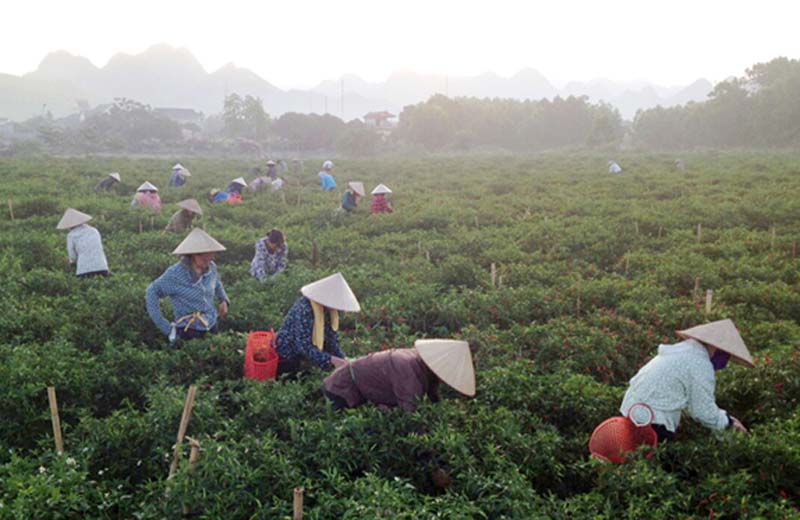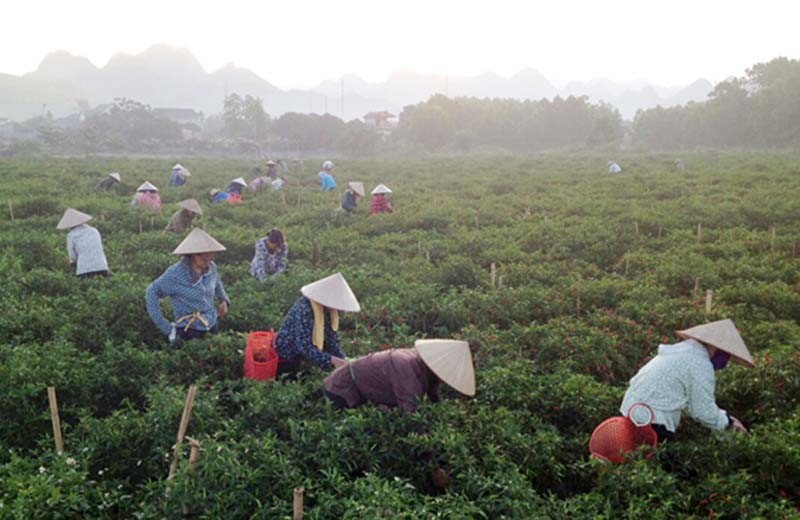
(HBO) - In 2017, the District People's Committee assigned the Department of Agriculture and Rural Development to coordinate with An Lac Commune to exploit 5 hectares of horn chillis F1 hybrid No.20, which has linkage in production and consumption of products under the Project of Linking production and consumption of chilli and pumpkin to ensure food safety in Lac Thuy district in the period of 2017-2018. The model has initially brought efficiency and is now replicating more in the area.

The model of growing chilli for export is in pilot
implemention in An Phu village, An Lac commune (Lac Thuy).
As being the commune selected to implement the
model of chilli planting, An Lac commune is located 18 km away from the center
of the district. The living condition of most people here is very difficult. The
implementation of linking production in the value chain in agriculture will
ensure the formation of concentrated commodity production areas and stabilize
output for agricultural products to reduce the market risks, increasing the
scale of production applying science – technology, increasing the key products
of the locality, linking the participation of the State - enterprises -
cooperatives and farmers in the value chain. An Lac Agriculture Service
Cooperative, Vietnam Chili Limited Company and farmers in An Lac Commune
implemented the model on the project area of 4 hectares with 10 households of
An Phu village to participate from 0.3- 0.5 hectares. To implement the model, the Department of Agriculture and Rural
Development in coordination with An Lac commune and other functional units held
a conference to propagate, launch
the content of the projects, guiding farmers to register
for technical training for farmers and witnessing the signing ceremony of the contract of linking and consuming the products; monitoring the implementation of
the contract between the parties. The
local people started sowing seeds in mid-October, 2017. After about 1 month
nursing, bythe middle of November, they were planted in the field. By March, 2018, they were ready for harvest. As a result, the fruit was big,long and ripe at the same time, fruit was at the weight of 70 items / kg, equivalent to the
yield of 1.2 tons / miles. With the average selling price of 5,000 VND
/ kg, after deducting the cost, the income
was at over VND 4.7 million / mile. The farmers earned 131
million VND in each hectare, which was much higher income than maize growing.
Thanks to the effective
model from An Phu village, in 2018, the area of chilli planting for export has
been expanded in the district. An Lac commune has expanded to 6 hectares, 5 hectares in Hung Thi commune, 4 hectares in Lac Long and 2 hectaresin Chi Ne
town.
According to data from the Hoa Binh Provincial Party Committee, the industrial production index for the first six months of 2025 is estimated to have increased by 20% compared to the same period last year. This marks the highest year-on-year growth rate for this period since 2020.
In the first six months of 2025, Hoa Binh province’s export turnover was estimated at 1.145 billion USD, marking an 18.11% increase compared to the same period in 2024. Import turnover was estimated at $ 804 million, a 17.15% increase, which helped the province maintain a positive trade balance.
The lives of the ethnic minority farmers in Tan Lac district have gradually improved thanks to the new directions in agricultural production. This is a testament to the collective strength fostered through the professional associations and groups implemented by various levels of the district’s Farmers’ Union.
With the motto the "product quality comes first,” after nearly one year of establishment and operation, Muong village’s Clean Food Agricultural and Commercial Cooperative, located in Cau Hamlet, Hung Son Commune (Kim Boi district), has launched reputable, high-quality agricultural products to the market that are well-received by consumers. The products such as Muong village’s pork sausage, salt-cured chicken, and salt-cured pork hocks have gradually carved out a place in the market and they are on the path to obtaining the OCOP certification.
In the past, the phrase "bumper harvest, rock-bottom prices" was a familiar refrain for Vietnamese farmers engaged in fragmented, small-scale agriculture. But today, a new spirit is emerging across rural areas of Hoa Binh province - one of collaboration, organisation, and collective economic models that provide a stable foundation for production.
Maintaining growing area codes and packing facility codes in accordance with regulations is a mandatory requirement for agricultural products to be eligible for export. Recently, the Department of Agriculture and Environment of Hoa Binh province has intensified technical supervision of designated farming areas and packing facilities to safeguard the "green passport" that enables its products to access international markets.



